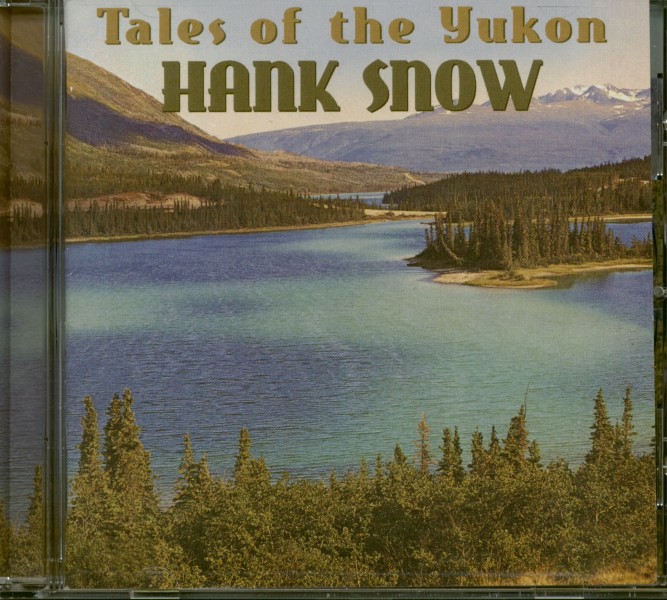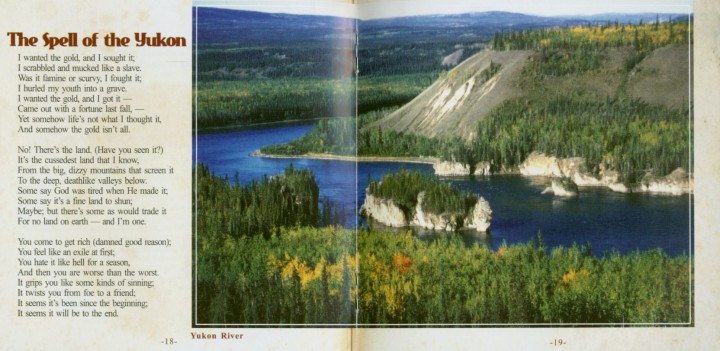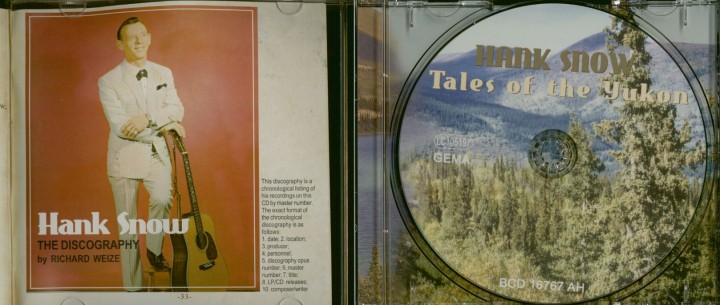Tales of the Yukon
“Hank Snow: Snow on the Tracks” has been added to your cart. View cart
Tales of the Yukon
Hank Snow: Tales Of The Yukon (CD)
1-CD-Album with 36-page booklet, 8 tracks. Playing time approx. 38 mns.
One of Canada’s best-known poets, Robert William Service was a man who celebrated the untamed vastness of the Canadian north, yet Service was from England and spent just a small part of his life in Canada. Born in Preston, Lancashire on January 16, 1874, he was the first child of a bank cashier who married the daughter of a wealthy distillery owner. Five years later, he went to live with his paternal grandfather, the postmaster at Kilwinning, Ayrshire in Scotland. He composed his first poem there – on his sixth birthday. By 1883, the Service family had moved from Preston to Glasgow, and Robert rejoined them. After leaving school, he followed his father into banking and worked at the Commercial Bank of Scotland. Selling verse as a sideline, he absorbed the work of his favorite poets, Browning, Tennyson, Thackeray and Keats. He also discovered Glasgow’s music halls, and developed an ear for common or vernacular speech (check out Bear Family’s music hall box, ‘Around The Town’ for much more on music halls). Moving on to the University of Glasgow, he studied English Language and Literature.
1-CD-Album with 36-page booklet, 8 tracks. Playing time approx. 38 mns.
Product description
CD Tracks
1: The Face On The Barroom Floor
2: Dangerous Dan McGrew
3: The Cremation Of Sam McGee
4: The Spell Of Yukon
5: The Ballad Of Blasphemous Bill
6: The Ballad Of One-Eyed Mike
7: The Ballad Of Hard Luck Henry
8: My Friends
In 1895, Robert Service turned 21, resigned from the bank, and left Glasgow for Montreal. From Montreal, he took the train across Canada, selling off his possessions for meal money until he reached Vancouver Island. He worked as a farm laborer for a Scottish family in the Cowichan Valley and then moved on to a more remote township to work for a man he called Hank in his autobiography, ‘Ploughman Of The Moon’. On Hank’s farm, Service found a stack of ‘Harper’s’ magazines together with a banjo. He eventually moved to Victoria to work on another dairy farm. His employer also ran a general store and post office, and Service became a storekeeper for four years, trading with the Siwash Indians and the local white settlers.
After saving $200, Service tried to return to university, but failed algebra. He took a job at the Canadian Imperial Bank of Commerce in Victoria, and transferred first to Kamloops, in the B.C. interior, and then to Whitehorse in the Yukon in 1904. He entertained at church socials by reciting Kipling and singing songs to his banjo accompaniment. ‘The Whitehorse Star’ editor suggested that he write something original about life in the Yukon. Service had heard about a prospector who had cremated his partner and he’d heard other tales from the pioneer settlers, so he began adapting them into verse. He eventually sent The Cremation Of Sam McGee and other poems to his father in Scotland asking him to arrange a small vanity printing for family and friends. He received a reply from the publisher returning his cheque and offering terms for publication rights.
Service was working at the CIBC in Dawson City when, on June 22, 1908, he and his bunkroom mates celebrated the publication of ‘Songs Of A Sourdough’. He wrote two autobiographical works, ‘Ploughman Of The Moon’ (1945) and ‘Harper Of Heaven’ (1948), and six novels, including ‘The Trail Of ’98’ (1912) about the Klondike Gold Rush. He also wrote more than 45 verse collections containing over one thousand poems. Several of his novels and his poem McGrew were adapted to movies. He made a brief appearance with Marlene Dietrich in the 1942 film ‘The Spoilers’.
A conscientious objector during World War I, he worked as an ambulance driver, and eventually married a French girl, Germaine Bougeoin. They lived in Brittany, France until the outbreak of World War II and then in California. They returned to Brittany after the war and Robert W. Service died there on September 11, 1958.
Colin Escott,
Nasville, Tennessee, July 2007
PS: Hank Snow’s LP, ‘Tales Of The Yukon,’ included Robert W. Service’s poems together with Face On The Bar Room Floor, attributed to Service, but actually by Hugh Antoine D’Arcy. The latter, a Frenchman (1843-1925) became a pioneer motion picture executive, and wrote The Face On The (Bar-Room) Floor in 1887. It became the basis of a Charlie Chaplin movie as well as a song. D’Arcy became a publicist for Lubin Studios and died in New York.







